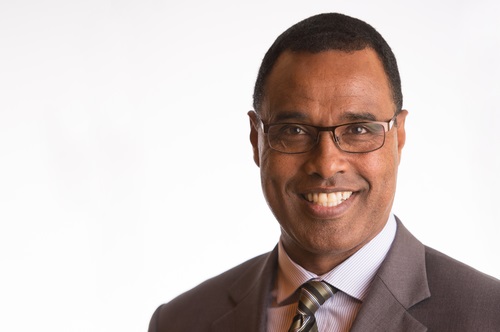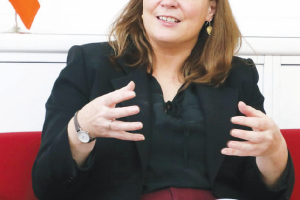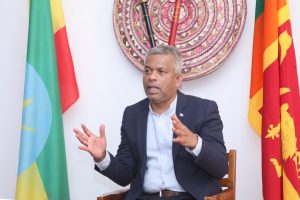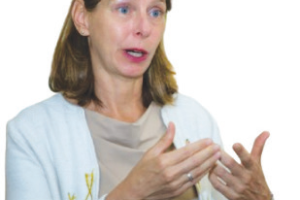
BY GIRMACHEW GASHAW
Today’s Guest Abdi Ahmed, an Ethiopian who migrated to the United States in 1983 where he studied Computer Science. The Same year, while doing his undergraduate studies, he landed on a job with Apple Computer as a programmer where he participated in the development of key design features of the Macintosh Computer.
In 1991, Abdi joined the Orange County Retirement System (OCERS) as a consultant where he designed and developed an automated system that maintained over a billion dollars in assets and collected millions of dollars in retirement contributions from various municipal employees.
Over the years, Abdi developed a multimillion dollar state of the art technology solution for various departments of the County of Orange including Social Services Agency Superior Court, and Planning and Development.
Abdi Ahmed is also an adjacent professor of Computer Science at Chapman University and Santa Ana College where he has been teaching since 1999. Abdi Ahmed holds a BS and MS in computer science from Azusa Pacific University. He also sits on the Advisory Board of Bioinformatics at Chapman University and Santa Ana College’s Business Division/ Computer Science Advisory Board.
IT is certainly a passion for business owner Abdi Ahmed. He worked for Apple Computer. He then went on to launch his own computer programming company called NetServe Systems. And these days, the business generates an annual gross income of nearly half a million dollars. “But before the success came the struggle” said Abdi.
The Ethiopian Herald had recently interviewed Abdi on the role of ICT and innovation to assist the overall reform and development works in the country. Have a nice read!
Could you tell us the reason for your migration to the US?
As the result of the war in the 70’s between Ethiopia and Somalia, my family migrated to Somalia as refugees and from there was an opportunity to go to the US which was an Internally displaced people(IDP) and I think this is a refugisation state. Thus, the migration was a matter of necessity but it was not a matter of choice.
What inspired you to design and develop an automated system? How long does it take? How do you see its impact?
I had a father who was very persistent in – from early childhood on explaining to me the need for being educated, the need for being self-sufficient, the need for being an entrepreneur. So when I came here, I was single-mindedly focused on first and foremost being educated. There was one class that was available, and all the classes that I was interested in were actually filled up, so I took computer science by accident.
Then I started to fall in love, basically, with programming. Through computers, (unintelligible) Apple and the computer company, and so I went there. And I went ahead and talked to those people and they told me that there was no job. So I took the bus again the next day and actually asked for the same job, and the
young lady told me that, no, there was no job. The third day, I came back and I said, Do you have any openings today?
And on my fourth day, she was frustrated with me, so she called the HR lady. Finally, she made a phone call to someone in the back, and the guy asked me to do some programming, some basic stuff. So I did that in five minutes or less. He asked me to come in, and actually offered me a job for 11 dollars an hour. Think of it, I’ve only been in this country for about seven months at that point in time.
I was not content with working for somebody else. I’ve always thought maybe I can do better. I can actually work for myself, and I knew the ramifications of being self-employed and the headaches, but I still wanted to do that because it resonated with what my dad said in terms of wanting to be self-sufficient financially as well as professionally.
So in 1996, when I founded NetServe Systems, I was a consultant with the county of Orange doing some IT software engineering services. That was a one-man shop, very content, again, with what I was doing.
So in 2001-2002, I decided to go ahead and actually hire people and take it to the next level. We’ve been honored as a Small Business of the Year for 2006 at the
California Small Business Association. Again, I have just received a letter from an organization called GLAAACC, or Greater Los Angeles African-American Chamber of Commerce, and they’ve honored us as the African-American Business of the Year for the entire greater Los Angeles area.
If you had a chance to visit technology institutions, universities in Ethiopia, how would you evaluate them?
I’m sorry to say it well. My observations that the caliber of students that I have seen even or the instructors was not what I expected it to be, not because our students are not talented, not because our teachers or instructors and professors are talented. We actually have the knowledge and delivering that knowledge and parting with it in a systematic way is a different story.
In the US, for example, there is a faculty development seminars and webinars. Every Friday morning from 10am to 12pm, there is a webinar, what they call professional education, to actually come and learn the latest. How do you deliver the most efficient lectures? How do you communicate with the students who need your help? Some of them are not expressive, some of them might be sitting there and have other issues besides just having knowledge in their head, or understanding the concepts of abstract concepts.
So one of the biggest disappointments that I’ve seen in this country is that, you see a lot of software engineering students and I showed a basic HTML code, they cannot parse it, the level or understand it. And the irony is, they do understand the technology, they have the fundamentals, but they don’t have it in a structured manner.
So, we really focus on the wrong things here. So instead of having that talent, they are well versed in theoretical aspects. The teachers probably are not paid very well. The students are there just to earn a degree and the writing skills and their coding skills are even worse. And I went to three different Universities in Ethiopia that actually talked to the professors. I think that is a part of 27 years of just being production oriented, instead of being quality oriented. And we need to really balance the two.
How do you see institutions be it government or private in terms of applying technologies that improve their performance and ensure governance especially here in Ethiopia?
Government participation is a matter of necessity for any project to really come alive. In 1986, Bill Gates made a comment that was very interesting. He said, “Software engineering is the only industry where the asset goes home overnight.” In software engineering as it is talent driven, the person actually has a more powerful machine than desktop or laptop at home or office.
So if you have 20 guys working in your company, which is your asset as a company and social engineering environment instead of having a 20 million USD worth machine. So when you go home, every night, and the asset of the company goes home, and there’s a good chance because they might come back tomorrow. And if it doesn’t, the company goes bankrupt. Therefore, you have a sense of obligation to ensure that your workforce is consistently satisfied and well maintained in terms of their payment, social standing to give to the families and everything else. So, technology is a matter of necessity.
By the way, if you think about third world countries, I remember I came in 2003 and I was in Dire Dawa together with Ambassador Mahmoud Driir. When we walked together, we saw people who were digging the ground to lay communication lines. And I said the world is going to prevail all over the place and all these infrastructures are really unnecessary. Third world countries are wiring from Europe to London and still have underground reservoir cables in the ocean. But in 1986, satellite connections started to solve that. Thus, there is no more infrastructure building.
When I was in America, it was much cheaper to make a phone call from the US to Ethiopia and I spent $14 a minute. Today, with WhatsApp, it’s free to do so. That doesn’t mean that they went out of business. Instead of being cable driven and wired driven connections, they went wireless and adapted the technology.
In Ethiopia, we have the exact opposite. You look at all these large companies; they just want to maintain the status quo. Tomorrow, there will be a competition seeking lobbyists. If there’s a financial liberalization, for example, you have a lot of problems. Thus, we need to adapt to new technologies. If this is so, Ethiopia will change.
You are actively participating in business forums, political platforms, and social gatherings. What motivated you to do so?
That is a good question. I went to the US at a very young age and the first thing I realized that America is a racist nation. As a black man, you have no choice better than becoming politically active within that context. That led me to actually join organizations like black men of America and others. After I had become fairly successful in academia and in business, I decided it was my obligation to give back to the community. As a result of it, I have become a member of a lot of nonprofits and organizations that help you at risk.
I am the Vice President of the Greater Los Angeles, African American Chamber of Commerce. That is the largest African American Chamber of Commerce in the United States. I sit on several different boards of nonprofit organizations.
After I came back here in August 2019, I sat down with President Mustafe and he asked me to invest in this country especially in my hometown Jigjiga and that inspired me. But prior to that, during the Abdi Ilay regime, I was very much concerned about what I was hearing.
In December 2017, I got involved in the organization that was working in the diaspora actively against Abdi ilay and his policies. I came here for the first time in April of 2018, when Dr. Abiy was elected. For about two months, we lobbied people to make sure that Abdi Ilay was gone. After we successfully did that, I never went to Jigjiga but I went back to work. So then I came back in August of 2019, so I came to Jigjiga and had a conversation about engaging in an investment.
I was reluctant because I know nothing about real estate investment. The president of the Somali State convinced me to think about it. So, they offered me land for the investment. We were able to finish the building with underground parking for 200 cars.
So yes, politically, I was active during that period but now it is over. We have a democratic system in place. I focused on the business.
What can you tell to the audience concerning the status of IT engineering and computer science advancement in Ethiopia?
Technology is not a thing owned by certain institutions because it is a talent. I believe Ethiopian students of technology are equipped with what I call undisciplined talent. It is not easy to produce talent. In Ethiopia, three years ago the average textile industry pay was 28 dollars.
We are now acting like China was just 30 years ago. If we concentrate on doing the right structure, the next step is we will be the China of Africa. We have to be structured, disciplined and remain focused. If you train students keeping the necessary quality, you have to first identify early where they should focus. Then, you have more productive talent. Students are naturally bright in grasping technical ideas, but conceptually they did not receive structured academic training.
This, in part, is due to 27 years of “mass production” without regard to quality. I have seen so many third or fourth year software engineering students who couldn’t write or explain basic HTML code, not because they couldn’t understand it, but because, I think, they didn’t have a structured environment that was conducive to learning.
Now that we have a new government that is committed to overhauling the educational system, I’m sure under the leadership of Professor Berhanu Nega, the department will restructure the entire educational system.
In Ethiopia, we have a huge opportunity to transform the nation by concentrating on technology and becoming an incubation center for technical talent.
Ethiopia has an amazing opportunity to lead Africa in technology if it manages to train the young generation and students properly and build a better technical infrastructure. Luring large foreign corporations will be fairly an easy task if we have good infrastructure coupled with liberalized financial institutions.
How do you relate Technology advancement with economic development?
They are integrated or interrelated. Economic advancement would not exist anymore without technology advancement. I remember reading an article not long ago when 4G & LTE was implemented in the Somali region, quoting the CEO of Ethio telecom saying that the Somali region’s daily transactions of digital money are over 6 million Birr more than the rest of Ethiopia combined. This is testimony to what can be done all over Ethiopia if the policymakers undertake concerted effort in liberalizing financial institutions and in building reliable technical infrastructure. Economy is driven by technology.
What do you recommend for policy actors to advance technology in Ethiopia?
The thing I want to recommend for the policy and decision makers is to liberalize the utility and financial sectors. By utility it means electricity and telecommunications. They should consider that competition increases the level of innovation. If you do not have a competition, there is no innovation.
In my view the obstacle to innovation is lack of liberalization of institutions. Thus, you need to liberalize institutions, bring in foreign investors, make playing field level and then automatically things will change. Otherwise what happens is, without innovation various constraints are going to happen. Constraints cannot benefit you. Innovation is a product of competitive processes.
Thank you
It’s my pleasure.
The Ethiopian Herald July 9/2022




